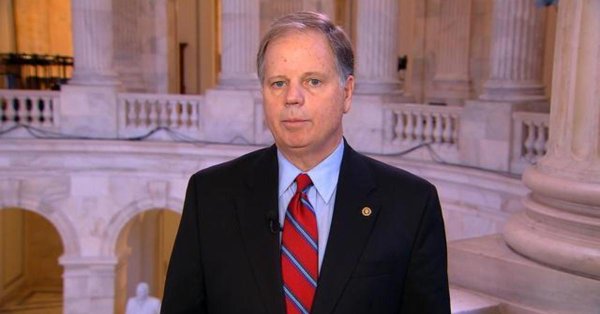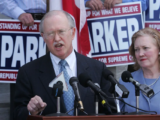By Glynn Wilson –
U.S. Senator Doug Jones, the new Democrat in Washington from Alabama, was asked to appear on “CBS This Morning” to comment on President Donald Trump’s first State of the Union address, scheduled for Tuesday night.
While many Democrats are planning on participating in “not watch” parties, and some Democrats are boycotting the speech, including Supreme Court Justice Ruth Bader Ginsburg, Jones is trying to play a bipartisan role, just as he did in his successful campaign over former judge Roy Moore, who ran as a far right conservative Republican.
On the State of the Union, when he was asked: “What do you need to hear from the president to unify the country? What exactly does he need to say?” Jones answered:
“I’m hoping and expecting that the President will deliver a presidential address, not a campaign address. I’m hoping he’s going to reach across the aisle.
“I think he’s going to be talking about unity. I think that’s the best way to advance the agenda,” Jones said. “I don’t think [the President] needs to draw a line in the dust and say, ‘It’s my way or the highway,’ What I think he needs to do is to try to lay out his goals [and] lay out some specifics of what he wants to do.”
Jones indicated he sees his election as “somewhat of a wake-up call for America that we need to really get together, to try to reach across the aisle, and to have a bipartisan agreement on these things, and get the country moving.”
Last week Jones played a pivotal role in voting with a bipartisan group of Senators who helped reopen the federal government after a brief weekend shutdown.
Bipartisan Group of U.S. Senators Reach Deal to Reopen Federal Government
Jones said there are areas both in immigration as well as infrastructure where Democrats and Republicans might be willing to work with the president to get some things done.
“But the question is one of tone,” Jones said. “I think the tone is going to be very important for him to try to reach out to Democrats and Republicans alike to try to make sure that we’re working together. This is not just a fight. It’s just not a battle between one faction or another, but something we can do as Americans.”
On immigration, Jones talked about focusing on the “two most important pillars of immigration right now,” echoing what other Democrats are saying. They are the need to fund the program for Dreamers, known as DACA, as well as border security.
“I think there can be broad consensus on those two pillars,” Jones said.
Trump is expected to put forward an agenda for a plan to rebuild the nation’s infrastructure as well as a demand for a larger plan for immigration reform. He has not said how the infrastructure plan would be paid for, and he has apparently abandoned his campaign promise that the border wall would be paid for by Mexico, which has refused to cooperate.
Jones said he voted to reopen the government even though the continuing resolution did not contain funding for the Dreamers in part because of his commitment to fund the Children’s Health Insurance Program, or CHIP.
“I campaigned a lot on the Children’s Health Insurance Program. That was an important part of my campaign. It’s important to my state, where 150,000 kids were getting pink slips for their health care,” Jones said. “That was very important that we were funding CHIP for six years.”
He also said the state would have been hurt by a shutdown of the federal government.
“We have a lot of federal dollars that come in,” he said. “So I looked at the whole picture. I was not happy, to be honest with you. I don’t think continuing resolutions are a way to fund the government. We need to get back to some regular order where we do a budget and have that.”
He explained his vote on the show.
Paycheck Fairness Act
In other news, Jones announced he will co-sponsor legislation designed to address the pay gap between men and women. The Paycheck Fairness Act, introduced by U.S. Senator Patty Murray, a Democrat from Washington State, would strengthen the Equal Pay Act of 1963 and guarantee that women can challenge pay discrimination and hold employers accountable.
“Despite making up half the workforce, American women still routinely face obstacles to receiving the pay and benefits they’ve earned,” Senator Jones said in a news release. “We have a duty to make sure that women are compensated fairly for the jobs they do. I’m proud to co-sponsor the Paycheck Fairness Act and I look forward to working with my colleagues to see this common-sense legislation passed.”
Five decades after the Equal Pay Act of 1963, women still make an average of 80 cents for every dollar earned by a man. The pay gap is even wider for women of color, with African American women making 63 cents on the dollar, and Hispanic women making only 54 cents, on average, compared with white men.
The Paycheck Fairness Act would strengthen and close loopholes in the Equal Pay Act of 1963 by holding employers accountable for discriminatory practices, ending the practice of pay secrecy, easing workers’ ability to individually or jointly challenge pay discrimination, and strengthening the available remedies for wronged employees.














